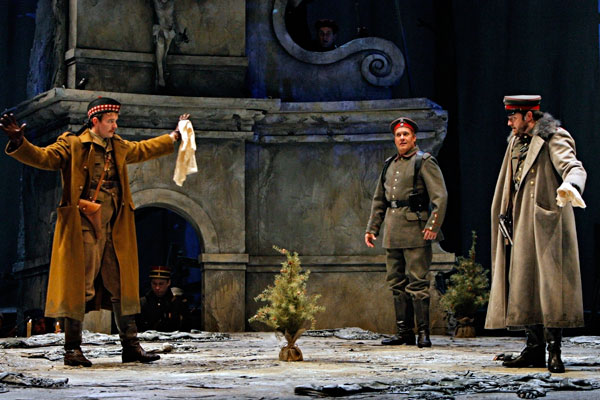Making its explosive world premiere at St. Paul’s Ordway Theatre, “Silent Night,” the dynamic first opera of composer Kevin Puts, weaves music, acting, and visuals together into a poignant portrait of World War I. Opera skeptics, never fear: this brand-new work engages all audiences, regardless of previous experience.
Based on actual events, “Silent Night” depicts Scottish, German, and French armies battling on the western front, following their different joys and fears as well as a mutual belief that the war will be easily won. Against the wishes of their superiors, the men spontaneously hold a truce for Christmas Eve; when morning comes, however, they’re reminded that the enemy soldiers they’ve befriended must be killed to win the war.
The most impressive accomplishment of “Silent Night” lies in the seamless collaboration of the music and the acting. Each army sings in its native language (with subtitles provided), every aria beautifully expressing the individual stories of the men fighting with engaging power: a German performer-turned-soldier singing during the truce; a French commander lamenting the loss of his pregnant wife’s photograph; a young Scot writing his mother of his brother’s success when in reality, he’s already been buried.
The Minnesota Opera’s design team creates a set that’s enormous yet intimate, with each army’s barracks stationed on a revolving stage around a center battlefield, which features an intense battle in the opera’s first scene. Backgrounds and set pieces––part of a bombed church steeple and leafless trees––give a gloomy, awe-inspiring atmosphere, complimenting the opera’s action.
To support new operatic works, a nine-camera team recorded “Silent Night” in high definition so it can be enjoyed beyond its live performances, which ended November 20. Though an official date has not been released, the filmed version will be available both in the U.S. and internationally in the near future.
“Silent Night” expertly blends together each aspect of opera into a tour-de-force, beautiful in its message of peace and the music that expresses it. The show not only asserts the irony of war forcing brother to fight brother, but gives a ray of hope for modern times: as one soldier writes home after the truce, “Few of us understood a word they said, but we didn’t need to.”




































![Teacher Lore: Mr. Hillman [Podcast]](https://bsmknighterrant.org/wp-content/uploads/2025/03/teacherlorelogo-1200x685.png)





